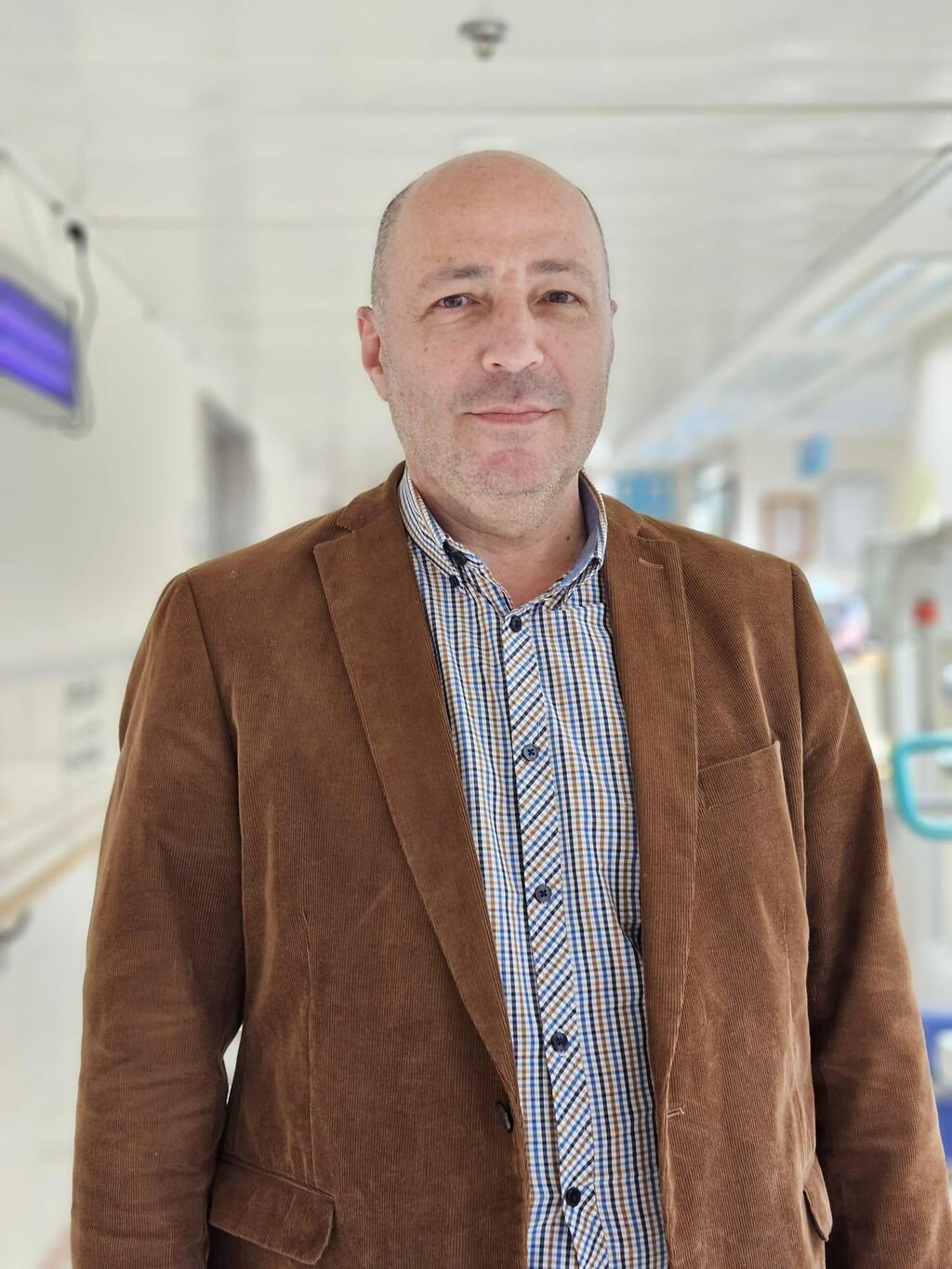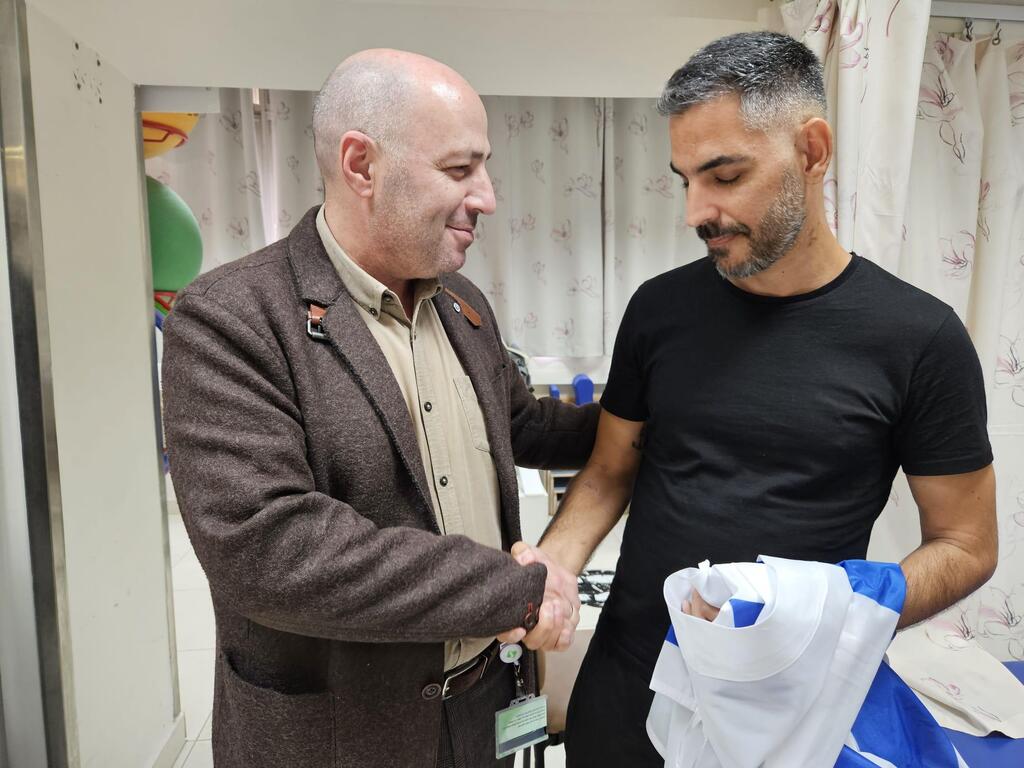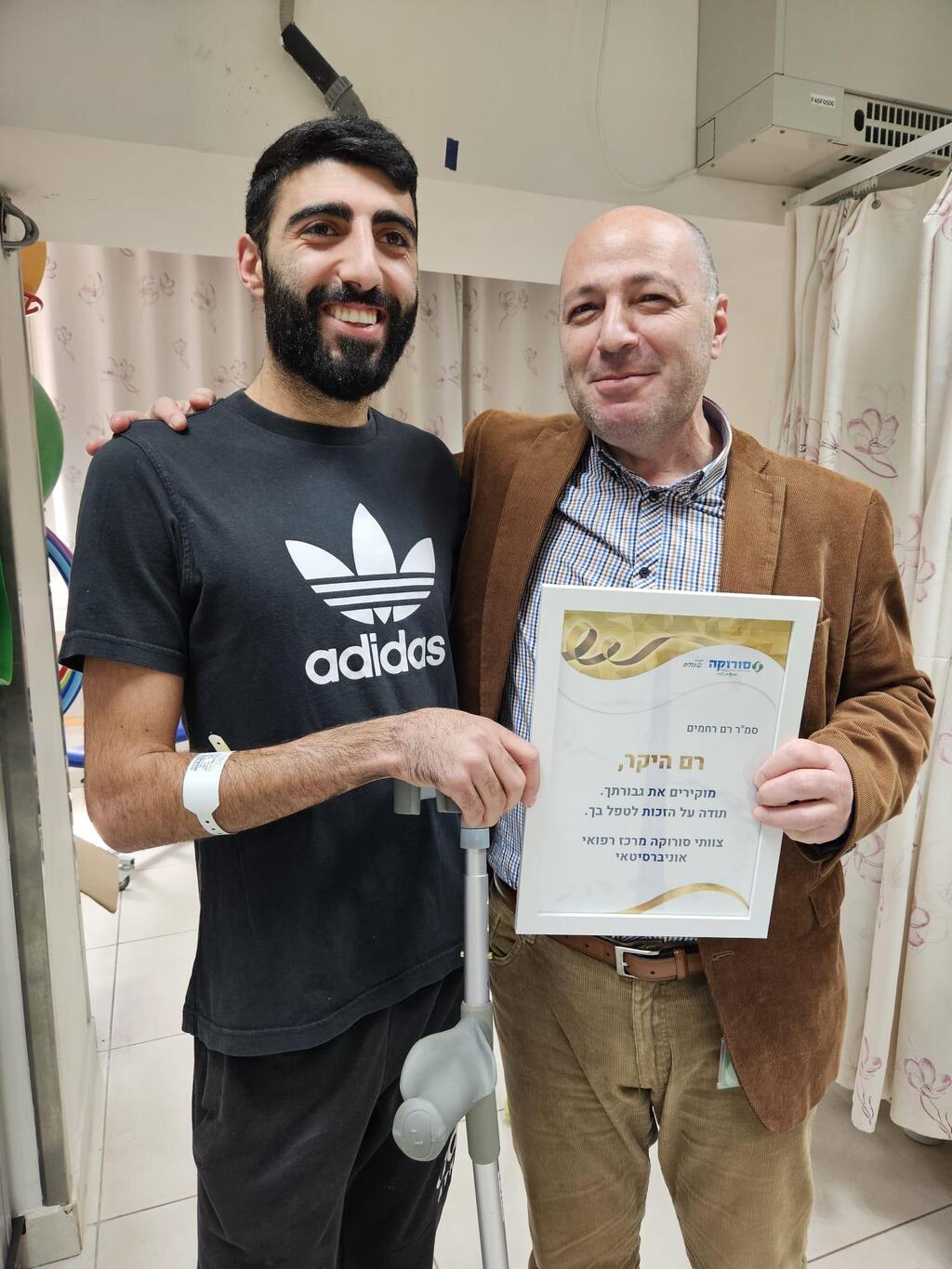For almost seven months now, Dr. Yuli Trager, director of the rehabilitation department at Soroka Hospital, has been working around the clock, managing one of the busiest departments since October 7. "I've been in the field for 30 years, and it's been a life journey," he said. "Medicine has advanced greatly, the soldiers and the injured we treat would not have survived years ago, and that's very exciting and fulfilling."
For 25 years, Dr. Trager had several roles at the Loewenstein Hospital, and has been working in Soroka since 2015. In addition to this role, he also serves as chairman of the National Committee for the Rehabilitation of the Injured and director of the Clalit southern rehabilitation sector. "The department was established for the southern residents. Before that, they had no way to respond in the area, and today they have direct access within the hospital."
Soroka's rehabilitation department was established nine years ago and it stood firm as the October 7 victims rushed in. "Immediately with the outbreak of the war, we realized that we needed to organize differently, and we certainly made a lot of changes to respond to the injured who come to us," said Dr. Trager. "On October 7, almost all the wounded were from the south. The burden on Soroka was enormous, and also on our department."
During the days when the wounded kept pouring in, Dr. Trager had to organize quickly and make the necessary changes to provide adequate treatment to every person. "We changed several things. We started receiving patients earlier because it beds had to be allocated for intensive care, surgery, and orthopedics so that departments could accommodate new patients. On the one hand, we began the rehabilitation process, and on the other hand, we relied on hospital teams to continue treating the wounded. They helped us, and we worked together," he explained.
"In addition, from day one, many patients who were not seriously injured were transferred to community rehabilitation centers. Some of them were discharged home, both because there was no room for them in the department and because they requested to be discharged home due to their moderate medical condition. However, these people suffered and their condition deteriorated at home," he said.
"Therefore, we decided to check every patient in different rehabilitation departments. We saw almost every war victim and checked if they needed rehabilitation. This was very serious work. Every day about 20 wounded people arrived at the hospital, but despite all the difficulty, it helped both the patient and the family to understand where we are rehabilitation-wise. We had to give priority to war victims. Very quickly, the department became a department for war victims. At the same time, we opened an additional department for general rehabilitation, he added.
Dealing with psychological injuries
The issue of mental health is not lost on Dr. Trager's department. "We have a team that knows how to handle a department of 20 beds. Today we have two departments, and the number of beds has doubled. We take care of about 45 beds every day. In addition, there is a senior physician who spends the entire day between hospital departments. Personally, I haven't taken a day off since the beginning of the war, and neither has a large part of the staff. It's not easy," he said.
"The majority of the injuries of the patients who arrive at the department are shrapnel injuries or blast injuries. Most of our focus is on various types of movement challenges stemming from the nature of the injury, as well as mental and psychological issues," he added.
How much can an injury affect one's mental state?
"Forget about war, even for a regular person who functions and suddenly falls and breaks their hip, there will be psychological consequences. It's both shock and anxiety, sometimes it's depression. These are normal reactions, nothing abnormal. We know how to address it. Both the entire team and the psychosocial team. But in war, it stands out more."
"If we're talking about soldiers, almost everyone can tell you about friends who were killed or injured right in front of them, and all the horror stories of war. There are consequences and there are signs of what's called 'acute trauma' which in some cases, if left untreated, becomes post-trauma."
How do you prevent the development of post-trauma?
"The rehabilitation team knows how to focus on this. On a very simple level, it's about talking and continuing to live, in full volume. The patients here are constantly engaged in action. It's important for them to rehabilitate, practice, and get their strength. Our team talks to them, from the doctor to the janitor in the department. That's the essence of a multidisciplinary rehabilitation team. This is, of course, beyond the conversations they have with psychologists and social workers. It's important to explain to the patients what will happen, what the next stages of the rehabilitation process will be, what the outcomes will be, and so on. All this is a very good remedy for preventing very severe psychological effects later on."
Are there any patients you remember specifically?
"I can tell you about someone who came to visit me recently. He was a lone soldier injured by shrapnel. The injury wasn't very severe, although there were many shrapnel pieces, but they didn't penetrate his brain or chest, and he didn't need intensive treatment. However, to his luck, we examined him the next day and saw that he didn't have the strength to cope on his own. He wouldn't let anyone touch him, he wasn't willing to try anything, he was always closed up in his bed. We immediately decided that we had to hospitalize him here and he underwent significant treatment with us.
"Community treatment is scarce in the periphery"
"During the rehabilitation, he underwent several orthopedic surgeries to remove the shrapnel that hindered his day-to-day. He's been home for a while now, and he even visited the U.S. He's smiling, happy, and full of life, and it does a lot of good to the heart. Yesterday, when he came to visit, he gave me a lamp with the inscription 'Best Doctor' and I keep it in my office. I have many heroic examples, but it's precisely the severely wounded ones that I worry less about; they receive a lot of attention. If we hadn't seen him, he would have been discharged home, and I guarantee without a shadow of a doubt that he would have been lost. It was precisely here in rehabilitation that we saved him. We're very proud," he said.
After 30 years of experience as a rehabilitation doctor, Dr. Trager still thinks there is room for improvement. "Community treatment is scarce in the periphery. It is getting to the point where I am admitting people that I would not have had to admit in terms of location. I could have sent them to any other hospital, but it must be close to home. A person cannot travel far every morning to get treatment in the suburbs, this is very significant," he said.
The amount of manpower is also a challenge. "Fortunately, at the beginning of the war I had a little staff surplus which immediately disappeared with the opening of the second department. This saved me. When opening a second department, we can take on more people. It is not easy to train a staff member. It is very important to have a great rehabilitation department in every major hospital in the State of Israel. Right now we are not there yet," he concluded.





